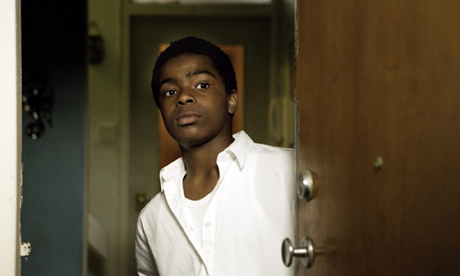Top Boy – review

Ra'nell (Malcolm Kamulete) in Channel 4's Top Boy. Photograph: Channel 4
Writer Ronan Bennett was reportedly concerned that comparisons of his uncompromising four-part drama Top Boy with acclaimed American TV series The Wire would overshadow the former, but he should have been more wary of another media obsession. Much has been made of the potential social implications of Bennett’s work, and its relation to the reality of life on Hackney’s estates, where the show’s ruthless gangs operate.
Yet whether or not Top Boy is an entirely accurate or indeed responsible representation of the sub-culture it depicts is ultimately of little consequence. For as a work of art, albeit a gruelling one, Bennett’s drama ticks all the boxes. Fiction, by definition, owes very little to fact, and Top Boy presents a narrative which captures the essence of a slice of London life in a manner rarely achieved by documentary.
The sense of entrapment in the estates and the lack of options available to its inhabitants is perhaps the most tragic aspect of the brutal world presented by this compelling drama. The characters’ diminished expectations are summed up best in the scene where Dushane tells drug kingpin Raines that he “wants a life”, to which the reply is: “you’re breathing ain’t you?”.
Top Boy abounds with wince-inducing gruesome violence: characters amputate rivals’ fingers and burn dissenters with irons, but nothing is more harrowing to watch than the relationship between 13 year-old Ra’Nell (Malcolm Kamelete) and his long-suffering, mentally-ill mother Lisa.
Played with touching tenderness by Sharon Duncan Brewster, Lisa seems to embody the ceaseless pain of existence in this tower block Inferno, and her helplessness represents the malady which effects all who surround her. Gangland heavyweights Dushane and Sully may be a boisterous duo, but they are ultimately being held captive in the same system as Lisa.
Judged purely as a piece of television, Top Boy sets a new high-mark for kitchen-sink drama. Bennett’s genius is in accentuating the human aspect of a community which, in some scenes, seems devoid of compassion and empathy. Loyalty, friendship and family turn out to be recognisably complicated and intricate in the value-system of these carefully crafted characters, who, at least in the context created, ring true.
